|
|
|
Sort Order |
|
|
|
Items / Page
|
|
|
|
|
|
|
| Srl | Item |
| 1 |
ID:
149036
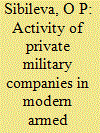

|
|
|
|
|
| Summary/Abstract |
The author considers the present activities of private military companies. Legal assessment of private military companies and their activity is given. Recommendations on legal and organizational work of the state with private military companies are presented.
|
|
|
|
|
|
|
|
|
|
|
|
|
|
|
|
| 2 |
ID:
161904
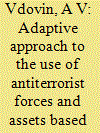

|
|
|
|
|
| Summary/Abstract |
This paper generalizes and systematizes characteristic features of armed conflicts outside Russia considering external and internal factors, as well as the typical composition and peculiarities of armed confrontation between the combat systems of the sides involving indirect actions in attendant activity areas. On this basis, the author defines the principal trends in military art and characteristic features of modern combined arms engagement.
|
|
|
|
|
|
|
|
|
|
|
|
|
|
|
|
| 3 |
ID:
098366
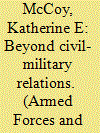

|
|
|
|
|
| Publication |
2010.
|
| Summary/Abstract |
This article applies the problem of civilian control over the military to the realm of private military contractors. The author argues that military outsourcing strips the principal -agent relationship of many of the structures and dynamics that states have traditionally used to control militaries. Many of the same qualities that make private military corporations successful as both economic actors and political surrogates also lead to reductions in the possibility for effective civilian control. The author supports these claims through an examination of the multilevel, fragmented, and global nature of the private military corporation market, with particular attention to divisions within the labor force. The implications of this analysis are that using private military corporations raises persistent challenges and tensions for effective state control that cannot be easily regulated away.
|
|
|
|
|
|
|
|
|
|
|
|
|
|
|
|
| 4 |
ID:
151753
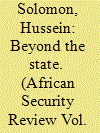

|
|
|
|
|
| Summary/Abstract |
Confronted with myriad security challenges, African states and the much-vaunted peace and security architecture of the African Union (AU) has proven not to be up to the challenge. Indeed, this is implicitly acknowledged by the AU itself if one considers the creation of such security structures as the African Mission in Somalia (AMISOM), which exists outside its peace and security architecture. This paper argues for a radical rethink of security structures on the African continent – one in which state structures of security coexist with newer forms of security actors, including private military companies (PMCs), community movements and the business sector. Whilst this shift in security actors is already happening on the ground, policymakers need to embrace this new reality.
|
|
|
|
|
|
|
|
|
|
|
|
|
|
|
|
| 5 |
ID:
183857
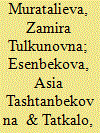

|
|
|
|
|
| Summary/Abstract |
The article examines the set of tools that China is using to expand its influence in Kyrgyzstan’s security sphere and the relationship of these actions to Russia’s traditional role in the region. Through in-depth interviews with experts in the military field, the authors conclude that Beijing is gradually ‘maximising power’ in relation to Russia, which still occupies a leading position in Central Asia (including education and the supply of weapons), in a manner that is non-aggressive and covert. These actions are reflected in the non-institutionalised nature of China’s interactions with countries in the region, which are more beneficial, in contrast, to institutionalised mechanisms. Beijing is betting on its ‘safe city’ system in Central Asia, which will allow the country to solve its own internal problems (Uyghur separatism, terrorism) while also strengthening Chinese influence in the security sphere by permitting it access to the data of Kyrgyz citizens and by making Kyrgyzstan more financially dependent on China; its educational programs for security service employees in Central Asia, which will, in turn, prepare the ground for the legalisation of the activities of Chinese PMCs (military contractors or ‘private military companies’).
|
|
|
|
|
|
|
|
|
|
|
|
|
|
|
|
| 6 |
ID:
110916
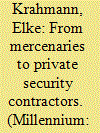

|
|
|
|
|
| Publication |
2012.
|
| Summary/Abstract |
The proliferation of armed security contractors in Iraq and Afghanistan has led to widespread criticism of their insufficient control through international laws and conventions. This article suggests that one reason for this omission has been the (re)construction of actors who provide armed force for profit in international legal discourses. During most of the 20th century, armed persons who participated in foreign conflicts for monetary gain were identified as 'mercenaries'. They were outlawed through international legal documents such as the United Nations (UN) Convention on Mercenarism and given restricted rights in the First Additional Protocol to the Geneva Conventions. Today, the same types of actors are increasingly defined as 'private security contractors', and new discourses and international agreements are emerging that attribute to them legality and legitimacy. The aim of this article is to examine the changing legal constructions of armed security providers since the 1970s and the consequences with respect to their control. The article argues that the (re)construction of actors who supply armed force for money in international legal discourses has been made possible by three main discursive strategies: the distinction between persons and corporations providing armed force for profit, the changing focus from the motivations of these actors to their relationship to a 'responsible command', and the shift from a concern about the actors to one about certain activities.
|
|
|
|
|
|
|
|
|
|
|
|
|
|
|
|
| 7 |
ID:
065952


|
|
|
| 8 |
ID:
050397


|
|
|
| 9 |
ID:
069897
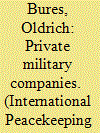

|
|
|
|
|
| Publication |
2005.
|
| Summary/Abstract |
This article analyses the perils and benefits of outsourcing UN peacekeeping to private military companies (PMCs). Various PMCs have a proven capacity to perform at least some peacekeeping functions. Although experts have expressed serious doubts whether their capacity to do peacekeeping will always translate into the achievement of peace and security, the author contends that PMC peacekeeping should not be dismissed on ideological or moral grounds when the choice is either a PMC operation or none at all. It is, however, imperative that the perils of using PMCs are addressed before peacekeeping is turned over to the private market. In particular, a set of clear mechanisms of accountability, control and transparency of the PMCs needs to be put in place.
|
|
|
|
|
|
|
|
|
|
|
|
|
|
|
|
| 10 |
ID:
138191


|
|
|
|
|
| Summary/Abstract |
The authors argue for the urgency and plain common sense of establishing private military companies (PMCs) in Russia, suggesting that PMCs have good chances of catching on in this country, and offer sound recommendations to make PMCs a part of the national defense system.
|
|
|
|
|
|
|
|
|
|
|
|
|
|
|
|
| 11 |
ID:
188318
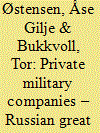

|
|
|
|
|
| Summary/Abstract |
In a situation where the Russian national self-image and economic realities fail to add up, this article discusses whether Russian private military companies have become low-cost tools to restore Russian great power status. Our findings suggest that whenever these companies are used in a ‘power as outcome’ way, they appear less successful at adding great power status on the cheap and less useful at elite enrichment. In contrast, PMCs seem well suited to make power contributions, and for a low cost, in a ‘power as prestige’ way. In these settings they are also more suitable instruments for informal elite earnings.
|
|
|
|
|
|
|
|
|
|
|
|
|
|
|
|
| 12 |
ID:
142819


|
|
|
| 13 |
ID:
124139


|
|
|
|
|
| Publication |
2013.
|
| Summary/Abstract |
The article analyzes the impact of private military companies (PMCs) on the duration of civil wars in Africa from 1990 to 2008. We develop an "opportunity structure" theory to argue that while PMCs are profit-oriented entities, the prevalent opportunities in conflicts will determine how they behave in war zones. Empirical findings for civil wars with at least 1,000 battle deaths show that as level of competition among government-hired PMCs increases, they are more likely to deliver optimal services and help bring an end to violence. In the absence of competition, the prevalent structure creates opportunities for PMCs to underperform in order to maximize profits by staying in conflicts longer. The authors also show that swift cessation of hostilities could benefit those profit-seeking PMCs that are compensated with contracts to extract natural resources because resource extraction generates more wealth in peace time. In such cases, the prevalent opportunities in conflict create an incentive for companies to deliver optimal service and terminate hostilities.
|
|
|
|
|
|
|
|
|
|
|
|
|
|
|
|
| 14 |
ID:
122242
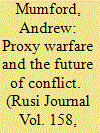

|
|
|
|
|
| Publication |
2013.
|
| Summary/Abstract |
The contemporary dynamics of proxy warfare will make it a significant feature of the character of conflict in the future. Andrew Mumford identifies four major changes in the nature of modern warfare and argues that they point to a potential increase in the engagement of proxy strategies by states: the decreased public and political appetite in the West for large-scale counter-insurgency 'quagmires' against a backdrop of a global recession; the rise in prominence and importance of Private Military Companies (PMCs) to contemporary war-fighting; the increasing use of cyberspace as a platform from which to indirectly wage war; and the ascent of China as a superpower.
|
|
|
|
|
|
|
|
|
|
|
|
|
|
|
|
| 15 |
ID:
167370
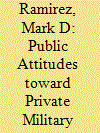

|
|
|
|
|
| Summary/Abstract |
This article examines the distribution and correlates of mass attitudes toward the privatization of US military operations. Relying on insights from principal–agent theory, we form predictions about what beliefs are associated with a willingness to grant authority over military operations to private military companies (PMCs). The model predicts that citizens’ beliefs about actor motives, accountability, and costs are associated with attitudes toward PMCs. Using a nationally representative survey, we find that beliefs about the profit-oriented motives of private firms and perceptions of their lack of accountability reduce support for the use of PMCs, particularly in combat operations. By contrast, belief in private firms’ superior fiscal efficiency increases support for utilizing PMCs in both combat and noncombat operations. The results illustrate the usefulness of principle-agent theory for understanding mass attitudes and help to improve the field’s understanding of the contours of public attitudes toward US defense policy.
|
|
|
|
|
|
|
|
|
|
|
|
|
|
|
|
| 16 |
ID:
062635
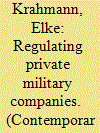

|
|
|
| 17 |
ID:
083740
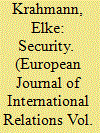

|
|
|
|
|
| Publication |
2008.
|
| Summary/Abstract |
The state monopoly on the legitimate use of violence in Europe and North America has been central to the development of security as a collective good. Not only has it institutionalized the state as the prime national and international security provider, it has helped to reduce the threat from other actors by either prohibiting or limiting their use of violence. The recent growth of the private security industry appears to undermine this view. Not only are private security firms proliferating at the national level; private military companies are also taking over an increasing range of military functions in both national defence and international interventions. This article seeks to provide an examination of the theoretical and practical implications of the shift from states to markets in the provision of security. Specifically, it discusses how the conceptualization of security as a commodity rather than a collective good affects the meaning and implementation of security in Western democracies.
|
|
|
|
|
|
|
|
|
|
|
|
|
|
|
|
| 18 |
ID:
087311
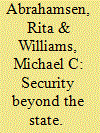

|
|
|
|
|
| Publication |
2009.
|
| Summary/Abstract |
To date, most discussion of security privatization in international politics has been focused on the role of private military companies and mercenaries. This article seeks to shift the focus away from the battlefields and toward the less spectacular privatization and globalization of commercial private security. Drawing on Saskia Sassen's notion of state "disassembly," we situate the growth of private security within broader shifts in global governance. Pointing to the weakness of seeing the rise of private security as an erosion of state power and authority, we show instead a re-articulation of the public/private and global/local distinctions and relationships into what we term "global security assemblages." Analyzing the role of private security in two such assemblages in Sierra Leone and Nigeria, we show how a range of different security agents and normativities interact, cooperate and compete, to produce new institutions, practices and forms of security governance. Global security assemblages thus mark important developments in the relationship between security and the sovereign state, structures of political power and authority, and the operations of global capital.
|
|
|
|
|
|
|
|
|
|
|
|
|
|
|
|
| 19 |
ID:
173826


|
|
|
|
|
| Summary/Abstract |
Compelling trends in international affairs, such as the rise of private military companies (PMCs) and the increasing fragility of many nation-states, have caused some observers to question whether the state-centric, Westphalian world-order will exist in perpetuity. In this light, epochal change theory posits that world-orders have constantly changed and we are now witnessing a transition to a new one. In this paper, I discuss how small groups of private equity investors now control impressive war-fighting capabilities, and that this acquisition of PMCs by private equity firms is further evidence of epochal change theory.
|
|
|
|
|
|
|
|
|
|
|
|
|
|
|
|
| 20 |
ID:
161124


|
|
|
|
|
| Summary/Abstract |
Since the 2003 war in Iraq, private military and security companies (PMSCs) have become increasingly legitimate actors in modern conflicts. Despite this normative shift, rumours in March 2015 regarding the use of South African mercenaries in Nigeria to combat Boko Haram insurgents caused an international outrage, while the Nigerian government remained nonchalantly silent on the matter. This article investigates the impact of mercenaries on the conflict in the last six months of the Jonathan government. Using primary and secondary qualitative research, it assesses the role that PMSCs played in Nigeria’s counterinsurgency strategy, along with the ensuing reaction of international and local media to the outsourcing of violence to foreign companies. The article concludes that – notwithstanding the improved image of PMSCs in the world, and the actual impact of the contractors on the Nigerian counterinsurgency effort – the stigma of mercenaries continues to plague the industry, particularly on the African continent.
|
|
|
|
|
|
|
|
|
|
|
|
|
|
|
|
|
|
|
|
|